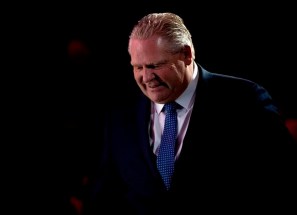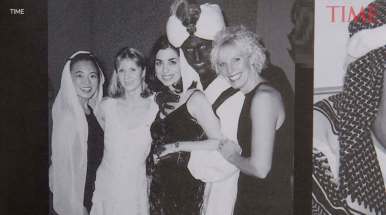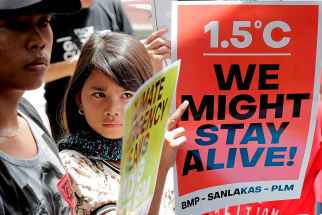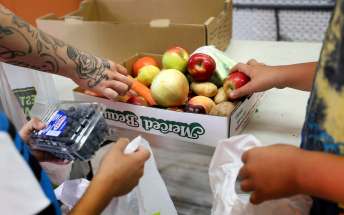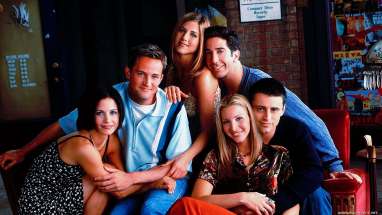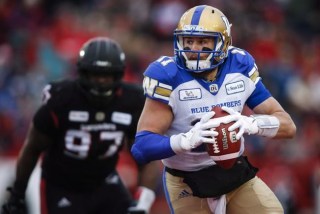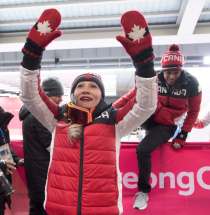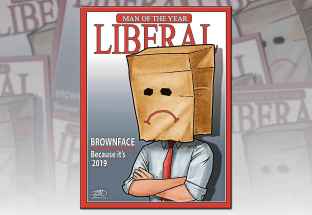The Ford factor He's not a candidate, but Ontario Premier Doug Ford and his controversial policies play a significant role in the federal election
Read this article for free:
or
Already have an account? Log in here »
To continue reading, please subscribe:
Monthly Digital Subscription
$0 for the first 4 weeks*
- Enjoy unlimited reading on winnipegfreepress.com
- Read the E-Edition, our digital replica newspaper
- Access News Break, our award-winning app
- Play interactive puzzles
*No charge for 4 weeks then price increases to the regular rate of $19.00 plus GST every four weeks. Offer available to new and qualified returning subscribers only. Cancel any time.
Monthly Digital Subscription
$4.75/week*
- Enjoy unlimited reading on winnipegfreepress.com
- Read the E-Edition, our digital replica newspaper
- Access News Break, our award-winning app
- Play interactive puzzles
*Billed as $19 plus GST every four weeks. Cancel any time.
To continue reading, please subscribe:
Add Free Press access to your Brandon Sun subscription for only an additional
$1 for the first 4 weeks*
*Your next subscription payment will increase by $1.00 and you will be charged $16.99 plus GST for four weeks. After four weeks, your payment will increase to $23.99 plus GST every four weeks.
Read unlimited articles for free today:
or
Already have an account? Log in here »
Hey there, time traveller!
This article was published 20/09/2019 (2291 days ago), so information in it may no longer be current.
RICHMOND HILL, Ont. — If Liberal Leader Justin Trudeau manages to hold onto his reign as prime minister this fall, he’ll have to convince the riding-rich Toronto suburbs that they voted the wrong way provincially last year.
That’s because in the Greater Toronto Area, Trudeau’s main target is someone who isn’t even running in the federal election; it’s Ontario Premier Doug Ford.

“He’s like our own Donald Trump,” said Nathan Auwyang, a resident of this bedroom community, speaking hours before photos emerged of Trudeau wearing brown and blackface earlier this week.
Auwyang lets out a chuckle and makes a pained expression when admitting he voted for Ford.
The Ontario premier led his PC party to a majority last June, after sweeping Toronto-area suburbs, often referred to by their area code: the 905.
Yet Ford’s brash persona and controversial cuts have made him one of the least-popular politicians in Canada.
One week into the federal campaign, Trudeau has tried repeatedly to paint Conservative Leader Andrew Scheer and Ford as brothers in arms, in what he calls attacks on health care and other social services.
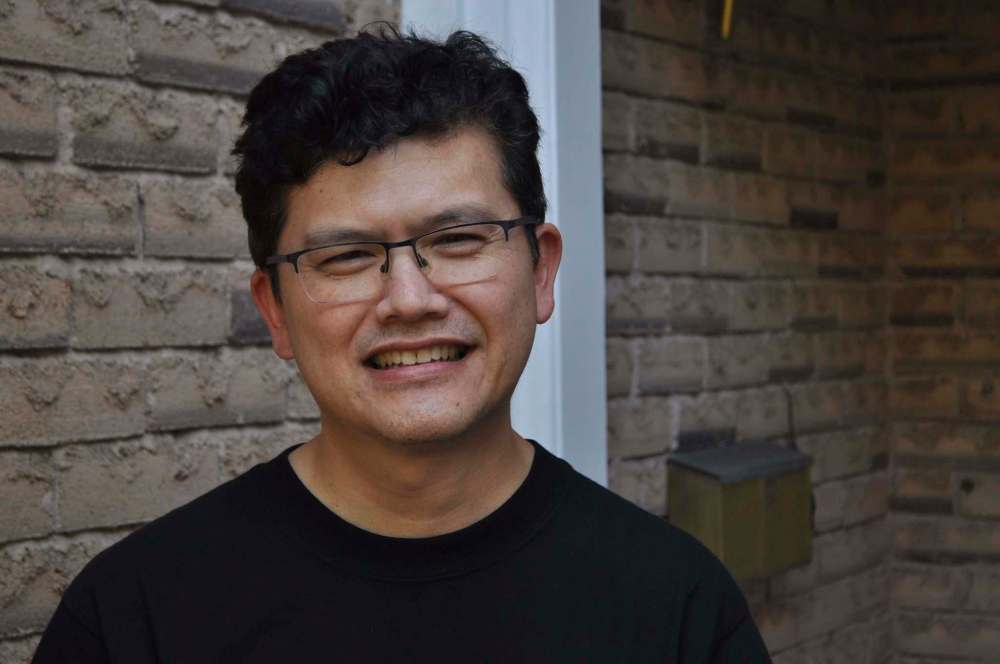
Scheer, meanwhile, is distancing himself from the premier and his controversial policies, to the point where his campaign team explicitly told Ford to avoid the campaign trail.
“I don’t think I can vote Conservative because I don’t want another guy like him,” said Auwyang.
Welcome to the 905, where the Liberals swept most of roughly 30 swing ridings in 2015. Almost all these seats voted for Ford provincially, and they could now determine Trudeau’s re-election outcome on Oct. 21.
Hydro transmission lines run parallel to a toll highway north of Toronto, which used to mark the cusp of the city’s suburbs.
Here in Richmond Hill, the former greenbelt is now a concrete jungle of glitzy new busways and subdivisions that are still being constructed. The riding voted 51 per cent for Ford provincially, after casting 47 per cent of ballots for Trudeau in 2015.
Across Ontario, Ford took government with 41 per cent of the popular vote, ending the provincial Liberals’ 15-year reign. Former premier Kathleen Wynne finished with an approval rate akin to Manitoba’s Greg Selinger after 17 years of NDP rule.
Once in charge, the Ford government consolidated public-health agencies, boosted school class sizes, riled francophones, appointed friends to government posts and bungled a reform of autism services.
“We voted out an unpopular government and got something even worse,” said Joe Carey, who’s voted Liberal, Conservative and Reform.
“I’m afraid that will happen again.”
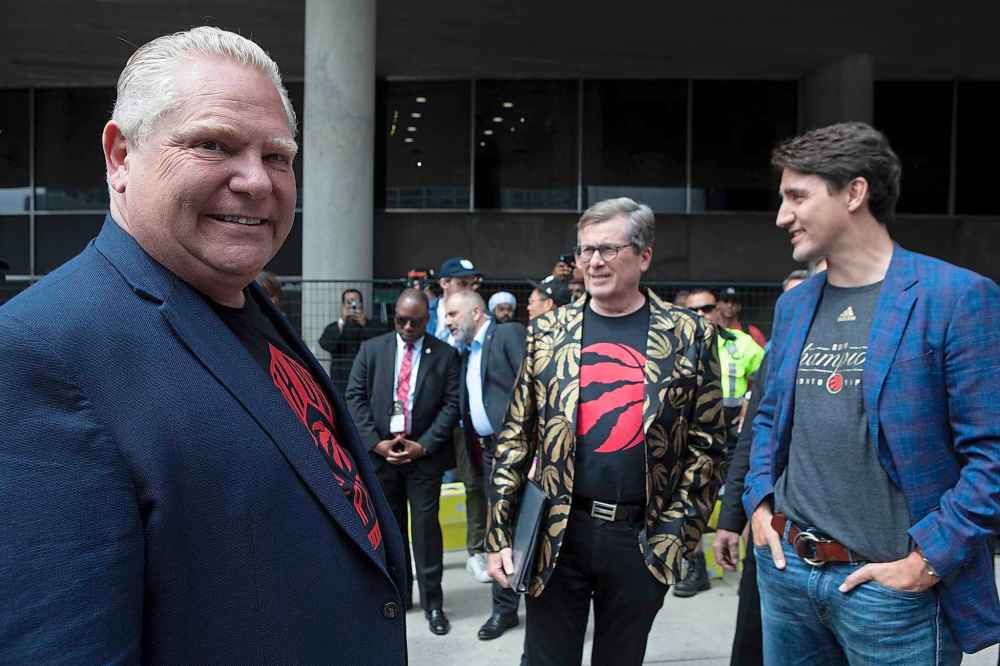
This June, Ford’s support had dropped to 29 per cent, at which point a third-party group ran television ads depicting Scheer as a bobblehead, who would say yes to Ford’s health-care cuts.
That month, Carey joined thousands of suburbanites in flocking downtown for the NBA Toronto Raptors’ championship rally. Trudeau gave remarks to the throngs, getting an applause. When Ford took to the stage, the crowd booed.
“I kind of felt sorry for him,” said Carey, a Richmond Hill resident who plans to vote again for Trudeau. “But it was kind of unsurprising.”

This spring, Ford adjourned the Ontario legislature until after the federal election in October, citing the breakneck speed of changes, and the need to recalibrate after a series of missteps.
“Ontarians are fed-up,” said Barry Kay, a political science professor at Wilfrid Laurier University in Waterloo, Ont.
Ford’s pledge to cut taxes and spending were popular, but he never explained how he’d achieve those savings, Kay said.
“The unpopularity of Ford is clearly bleeding over to the federal Conservatives. And that’s why they’re trying to put him under wraps.”
“The unpopularity of Ford is clearly bleeding over to the federal Conservatives. And that’s why they’re trying to put him under wraps.” –Barry Kay
Federal Conservative sources have told media that Scheer’s office explicitly asked Ford to keep away and avoid gaffes that could help return Trudeau to power.
Scheer insisted last week it’s “completely false” that he’s avoiding Ford, but the two never seem to be in the same region this campaign.
That’s despite Scheer congratulating Manitoba Premier Brian Pallister on his re-election during a visit to Winnipeg this week.
Scheer and Ford met at Queen’s Park last October, and shared the stage two months prior at the federal Tories’ convention. Carey can’t imagine seeing them in the same room now.
“Ford’s having a huge impact in the race,” Carey said.
Nga Berglas, 75, has a comfortable home and an ornate lawn, both of which are a source of pride.
Berglas was born in Vietnam, where she worked as a teacher before fleeing the country’s humanitarian crisis 40 years ago.
She worked meagre jobs while becoming an accountant. Berglas voted for Trudeau in 2015, but won’t be doing so this time around.
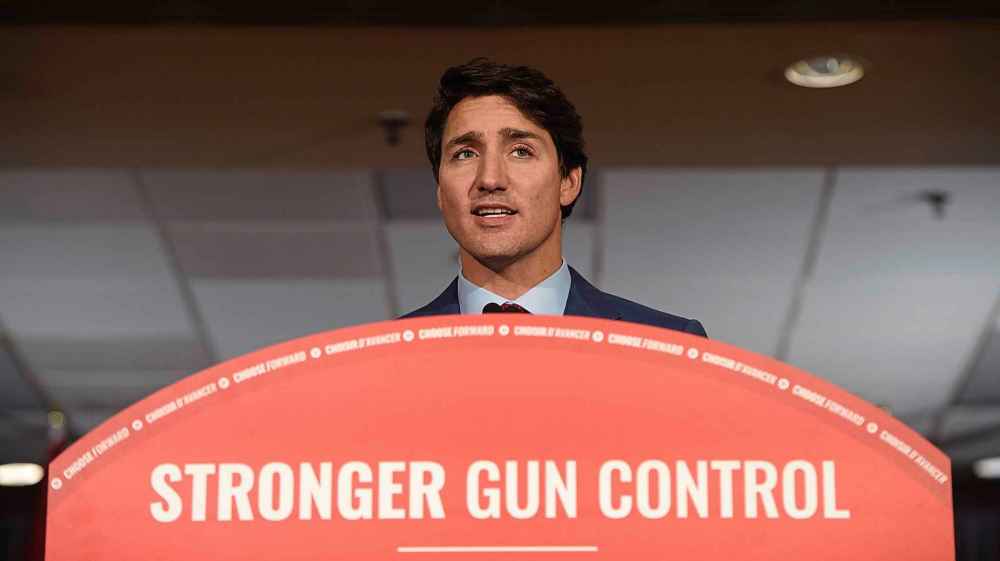
“He doesn’t know what it means to work hard. He was born into having connections,” said Berglas, a point raised by numerous neighbours who were born abroad.
“He doesn’t understand most Canadians,” she said, relaying the prime minister’s ridiculed costumes in India, the SNC-Lavalin scandal and the controversial changes to business taxes.
To her, those are more damaging than pinning Ford’s flubs onto Scheer. “People can see the two are different.”
Moments earlier, Scheer visited a Cantonese bakery in a strip mall during its lunchtime rush, to pose for photos with staff.
Amid the clamour of television cameras, constituent Tom Vassos spots Scheer and asks for a photo.
Afterwards, Vassos said he wasn’t sure whether Ford will influence the election, but says Scheer could make his own impression with voters if he’s visible enough.
“A lot of the time it’s the faces we see leading the parties that tend to decide our votes.”
A 30-kilometre drive west from the upper-middle class neighbourhoods of Richmond Hill leads to Etobicoke, where the Ford family has leveraged a populist, anti-elite message to lead both city council and the provincial parliament.
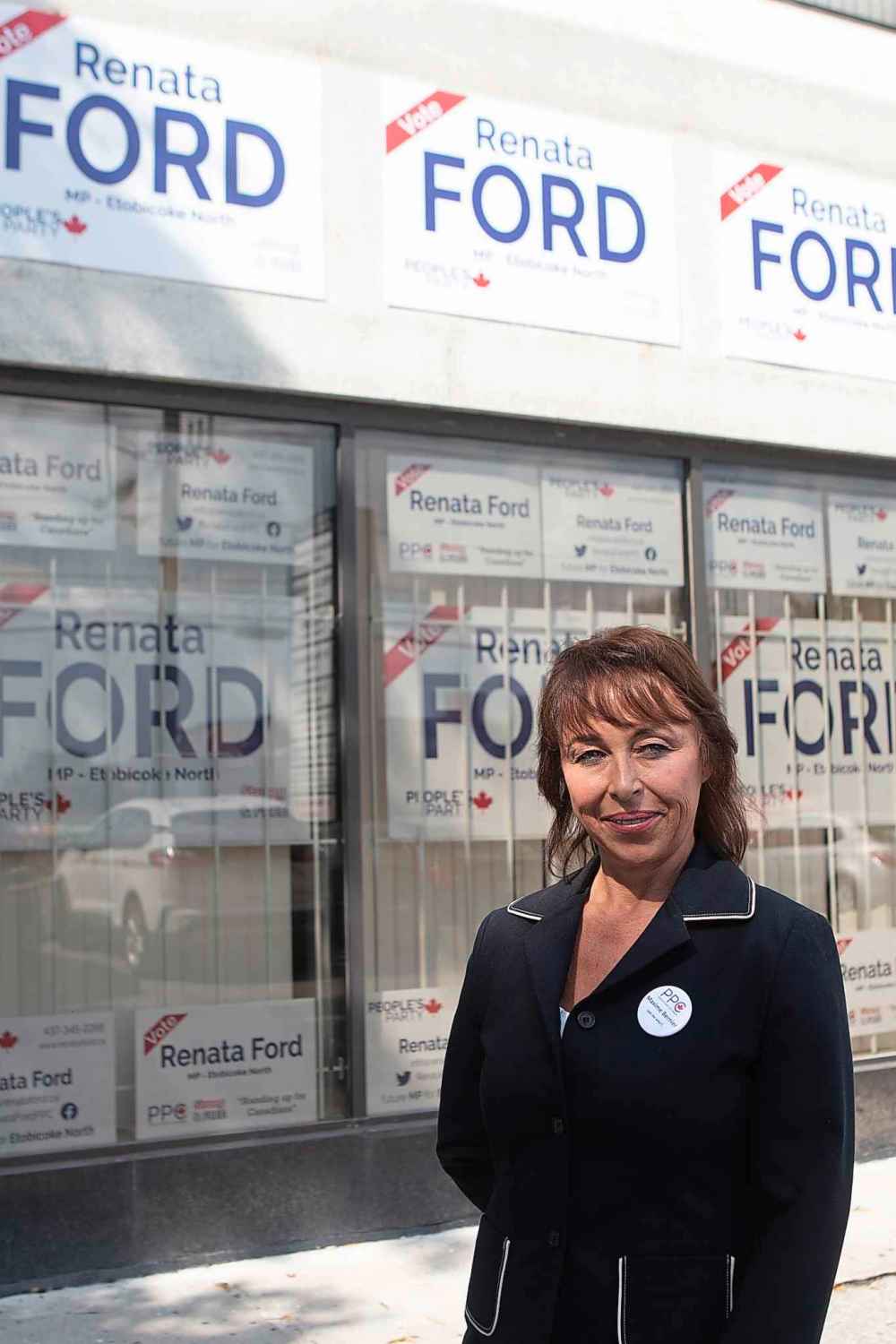
The widow of former mayor Rob Ford, Renata Ford, is running in the federal riding for the People’s Party of Canada (PPC). She’s started door knocking at bungalows, public-housing units and high-rises.
A week into the campaign, Renata Ford has scarcely any lawn signs, though almost everyone knows her name. A recent riding poll said 15 per cent of respondents planned to vote for her.
In Ottawa, federal Tories worry PPC Leader Maxime Bernier will sway voters and attention from Scheer in swing ridings, especially now that both leaders will be in the official television debate.
But at a Conservative rally last Wednesday, supporter Jay Dahman dismissed that concern.
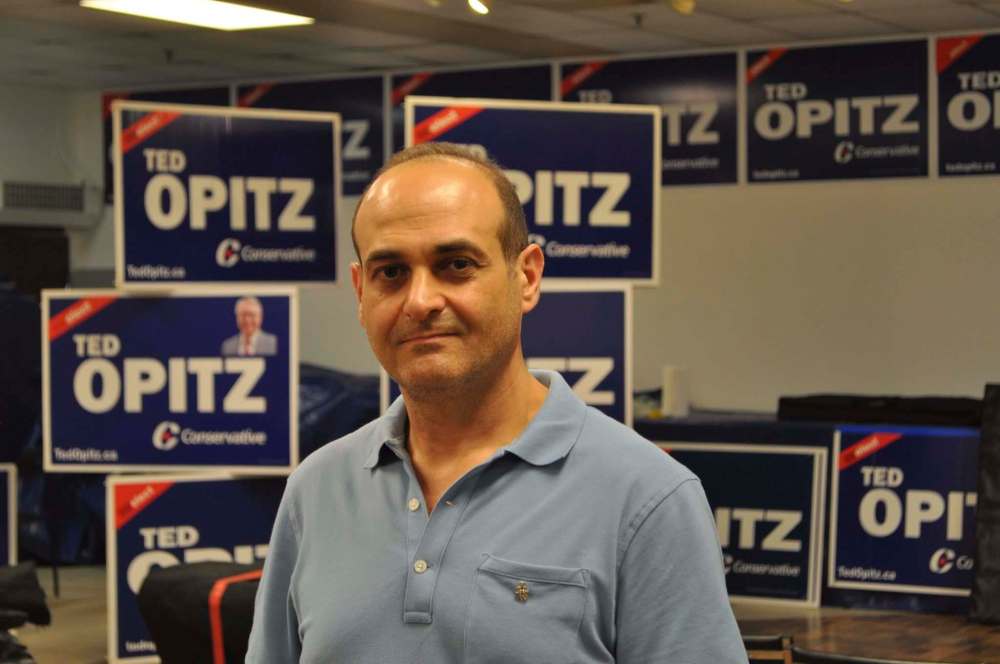
“There’s only two parties that are realistically going to win,” said Dahman.
He said people in Etobicoke voted for Ford “to clean up the mess” of the province’s debt. To him, Ford’s unpopularity is a blip that will come full circle when the books get in order.
“The Liberals only link the two to distract from stuff like SNC-Lavalin,” he said of Scheer and Ford, getting nods from his fellow partisans.
At a bus stop in Pickering, Ont., Carol Vallie rolls her eyes at the mention of Ford’s name.
“Where do I begin,” Vallie said, reciting cutbacks, gaffes and patronage appointments.
Rob Ford still a hometown hero
TORONTO — While deceased former mayor Rob Ford is known internationally for smoking crack cocaine and making crass comments, he is beloved in his neighborhood of Etobicoke.
TORONTO — While deceased former mayor Rob Ford is known internationally for smoking crack cocaine and making crass comments, he is beloved in his neighborhood of Etobicoke.
Across the street from a high school where Ford used to teach disadvantaged kids football, John Dimou said the former mayor was one of the few plain-speaking politicians he’s ever met.
“He wanted to save money but without hurting people,” said Dimou. He worries cutbacks to sports and arts programming have contributed to the past week’s spate of shootings in this part of Toronto.
Rob’s widow Renata Ford is running in the federal riding of Etobicoke North for the People’s Party of Canada.
Renata is suing the Rob’s brother, Premier Doug Ford, over her late husband’s estate, and recently completed drug rehab.
Despite scarcely any lawn signs one week into the campaign, she is gaining local support.
An EKOS poll of the riding taking three weeks ago found 30 per cent of voters would considering supporting Renata, half of whom said they were “certain” to vote for her.
That would likely split right-wing support in a riding that historically votes Liberal.
Carol Crosgrey is sick of politics, but would consider voting for someone like Rob Ford.
She recalls the former mayor calling her house to invite her to rallies. As a councillor and then mayor, he’d often be seen speaking with constituents.
“Doug Ford is nothing like him. It’s all just cut-cut-cut,” she said, sitting on a porch.
Her husband Ken said enough people in Toronto are poor, and he wants Canada to cut back on immigration.
“Rich people are getting ahead, while everyone else is struggling,” he said, pausing at the booming sound of a jumbo jet landing at nearby Pearson airport.
—Dylan Robertson
Vallie lives in Oshawa, home of a major General Motors plant, which the company announced last November it would close down, after a century of making cars.
“The Liberals said they were going to protect us,” she said, questioning whether new trade deals will leave her city better off.
Historically a blue-collar union town with NDP roots, her riding has voted Tory since 2004.
“None of them are really appealing to me,” Vallie said, looking out as commuter trains speed alongside the crawling gridlock of Highway 401.
Sky-rocketing housing prices have families moving deeper into the suburbs, one of the many issues she thinks deserve more attention than whether Scheer is Ford 2.0.
“I don’t like Doug Ford,” she said. “But I don’t know who to vote for that will actually help us,” she said.
Kay, the professor, runs weekly seat projections based on a handful of polls. Friday’s analysis declared 10 of about 30 Toronto-suburb ridings “too close to call.” Another seven have a candidate leading by less than 10 per cent, like Oshawa.
“There’s not a great deal of enthusiasm for anybody in this election,” he said of the 905.
dylan.robertson@freepress.mb.ca
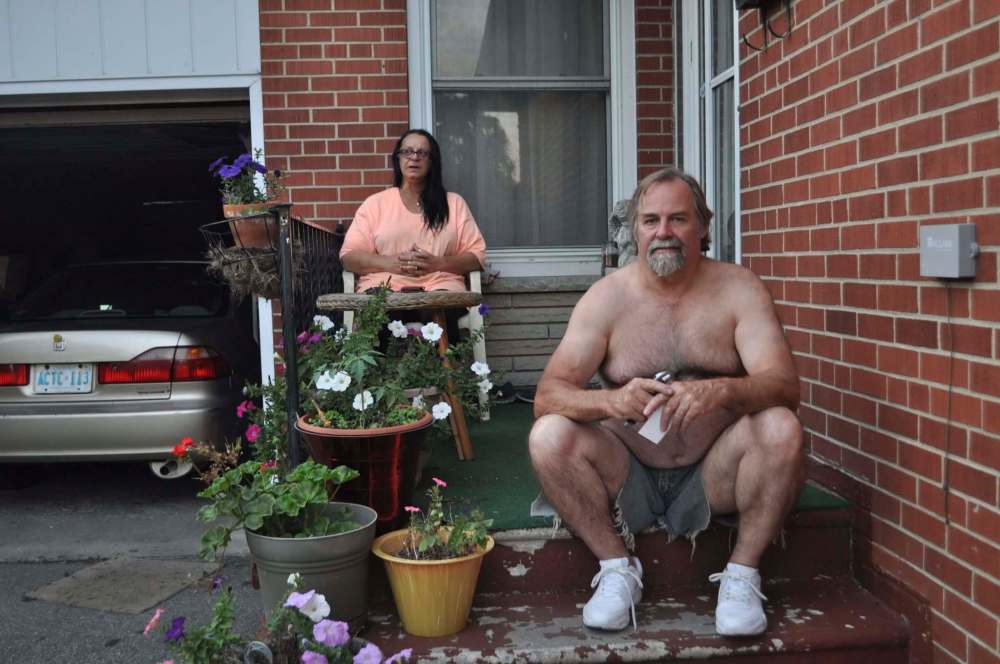
History
Updated on Monday, September 23, 2019 3:35 PM CDT: Name fixed.















